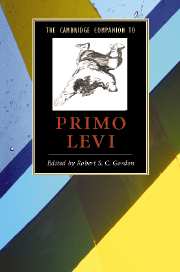8 - Primo Levi’s languages
from Part IV: - Language and Literature
Published online by Cambridge University Press: 28 November 2007
Summary
Some readers may feel a sense of unease at treating Primo Levi's work (and particularly his writings about the camps) as literary objects, rather than texts crucial for their ethical, political and historical value. But, as Cesare Segre has argued, 'ethical commitment' is 'among the most important parameters for evaluating a work of art': in both this and the more strictly literary sense, Levi is 'one of the greatest writers of the twentieth century'. Similarly, Daniele Del Giudice notes, in his introduction to Levi's works, that Levi's personal experience of the concentration camp and his ethical commitment to the truth in no way diminish the nature of his account as 'narrative invention' or 'representation' (OI, xiii). His testimonial writing is 'the totally “experimental” and literally unprecedented enactment of a narrative, which was the only way that post-Auschwitz allowed Auschwitz to be recounted' (OI, xxx-xxxi, our translations). It is in this context that this chapter hopes to contribute to a discussion of the role of language in Levi's work. Its emphasis is less on precise textual analysis and more on his own views on language and style and engagement with language and languages, which relate very closely to the core concerns of his writing.
Levi was a writer of a very particular and unusual kind. His relationship to language and to literary language was driven by an intense interest in and enthusiasm for the functioning of different languages and sign systems. His literariness, his style, grew out of what we might call a 'linguistician's mindset'. To understand this mindset and this style better, the following discussion will look in turn at his engagement with idioms beyond Italy, with dialects and varieties of his native language, his style, and their links to the centrality of communication in his testimonial work.
- Type
- Chapter
- Information
- The Cambridge Companion to Primo Levi , pp. 121 - 136Publisher: Cambridge University PressPrint publication year: 2007
- 2
- Cited by



